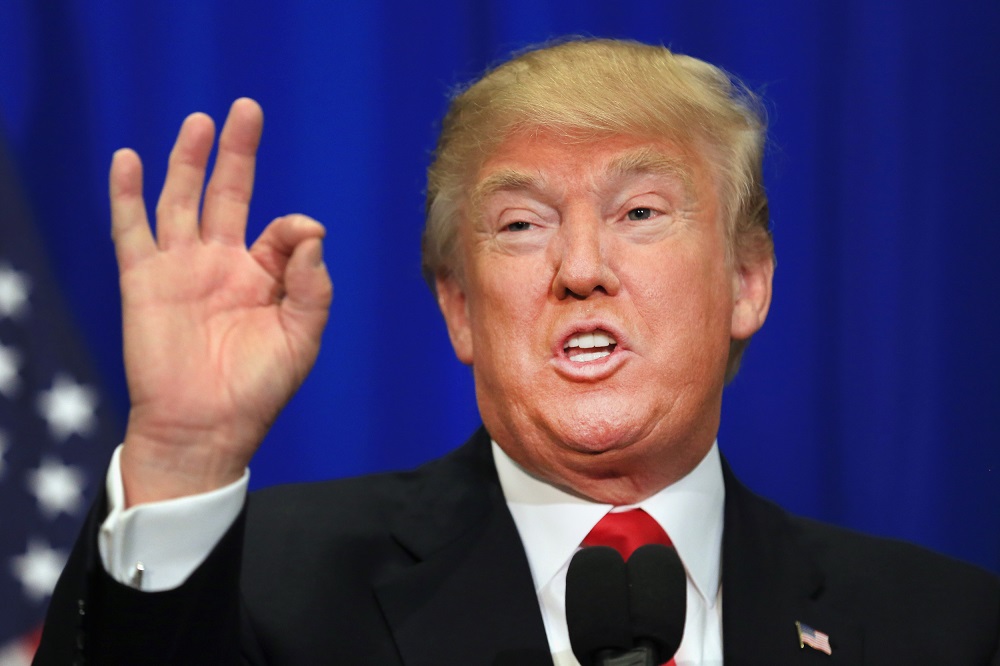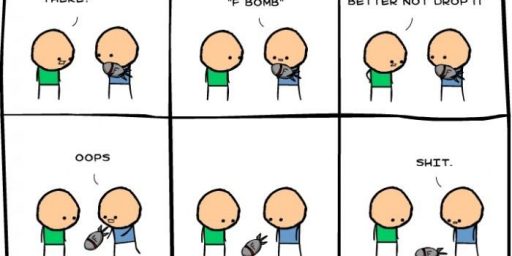Trump and Violating the Norms of Political Speech
An essay from earlier in the year by Jacob T. Levy underscores some of the points I recently tried to make about democratic norms in the current era.

In a recent post, I detailed three baskets in which to place discussions and critiques of President Trump: public policy, policy ignorance, and norms-violations. In regards to that last category, which is the one that is the most significant, I would suggest an essay by Jacob T. Levy from earlier this year (but which I finally read this week after having book-marked it back in February): The Weight of Words.
The essay is long, and worth a read in full. I will not try and summarize it, save to note that it hits on a theme that has been discussed in the comments sections (and in posts) here at OTB: whether we should pay attention to the over-the-top rhetoric used by this president (especially on Twitter), or whether we should take it seriously. Levy clearly comes down on the “take it seriously” side, and I concur with his position and reasoning.
Along those lines, and in the context of Trump’s “shithole/house countries” remarks, Levy starts with:
This seems to be part of a broader developing idea: ignore the tweets. Ignore Trump’s inflammatory language. Ignore the words. What counts is the policy outcomes. People took Trump’s “American carnage” inaugural address seriously, but after an exhausting year, it’s tempting to find an excuse to stop listening.
Among too many conservatives and libertarians of the “But Gorsuch and tax cuts” variety, this is a way of saying “everything’s fine.” Among some on the left, such as CoreyRobin, it’s a way of saying that Trump is a normal conservative, with all that entails for the moral status of other conservatives. Indeed, Robin sometimes draws comparisons to the policy disasters of the whole George W. Bush presidency (the Iraq War in particular) to suggest that Trump’s first year isn’t even particularly bad as far as Republican administrations go. And one-year-in retrospectives have often adopted the world-weary stance: Trump might talk like an authoritarian, but it doesn’t really matter because he hasn’t gotten his way. What he wants might be disastrous, but a year later we’re still in NAFTA and NATO, there haven’t been mass deportations, Hillary Clinton hasn’t been thrown in jail, the separation of powers is intact, and so on. Just ignore his words.
I have a hard time believing that anyone really thinks like this as a general proposition. Certainly conservatives who spent the postwar era reciting the mantra “ideas have consequences” didn’t think the words that carried political ideas were impotent. The longstanding view among conservatives was that Churchill’s “Iron Curtain” speech and Reagan’s call to “tear down this wall” were important events, words that helped to mobilize western resistance to Communism and to provide moral clarity about the stakes of that resistance. More recently, conservatives over the last ten years seemed to attribute totemic powers to words like “radical Islamic terrorism”—or, for that matter, “Merry Christmas.”
Politics is persuasion as well as coercion. Immediate policy outcomes mainly have to do with coercion: who is taxed, regulated, expropriated, imprisoned, deported, conscripted, what wars are fought, who is kept out of the country by force of arms. This can’t be neglected, of course. The early theorists of “deliberative democracy” in the 1990s seemed to overestimate the importance of speech in politics, imagining a world in which high-minded parliamentary debate on the floor of the legislature regularly changes lawmakers’ minds and supersedes partisan positions, or in which voters engage in jury-like deliberations forever, never reaching a vote or the coercion that follows. But many others underestimate the importance and power of political speech, often under cover of seeming hard-headed and practical.
Indeed coercion and persuasion, power and speech, are always difficult to disentangle in politics.
Two things. We see here the same categories (policy and norms) that I discussed last weekend as well as an underscoring of what should be obvious: words and language matter in politics. Levy concludes the introduction to his essay as follows:
Greg Sargent and I have both argued that one particular kind of Trump’s speech, his especially outrageous and transparent lies, are words that have shaped the world: demonstrations of power, attempts to undermine the existence of shared belief in truth and facts. In the rest of this essay I will look at some other ways in which Trump’s speech becomes part of political reality, as he and the media outlets that serve as his megaphone address the world, the US government, and the people.
He goes on, again in a piece I highly recommend, to detail the problems in these areas as he sees them.
I will note the following from his conclusion, which connects the area of listening to Trump’s words and how they intersect my (and many others’) concerns about norm-breaking in a democratic context:
The business of prioritizing procedural norms, the rule of law, alternation in power, and electoral fairness is psychologically difficult. It’s counterintuitive to believe your cause is right and also to believe that it’s right for your side to lose roughly half the time. Being a good sport isn’t easy even in sports, and the stakes are much higher in politics. A lot of people, including a lot of elected officials, never really manage it. But stating the norms out loud—in the US, affirming that they are central to the American system—helps to balance out the authoritarian and populist temptation. Failing that, keeping one’s mouth shut (the way Mitch McConnell just smirks and shrugs when he changes Senate rules in order to make sure his side wins) has something to be said for it. But what populists and authoritarians do is to make a virtue out of the inclination to love our in-group and hate the out-group. As with his embrace of white nationalism, Trump’s equation of opposition with crime and treason isn’t just “norm erosion,” a phrase we have seen a lot of in the last year. It’s norm inversion,aligning the aspiration to do right with substantive political wrong.
Emphasis mine.






The Levy piece doesn’t–or at least what I’ve read of it–take into account the degree to which for Trump, everything is deeply personal. He doesn’t have ideas or an ideology, or at least nothing that’s coherent and fixed. He says what he says in the hope it will make him adored. He likes the white nationalists because they like him.
Levy’s essay seems directed at “Trump apologists” who are pooh-poohing Trump’s norms inversion, not guys like me who find a fixation on Trump’s tweets to be a terrible waste of time and energy for someone who is already convinced that Trump’s norm-flouting is dangerous.
And it seems to me that if this is true:
Then it’s a mistake for the opposition to amplify those speeches and unhinged tweets, to consider them important and “official,” because what are you doing then? You’re buying into the idea that the Republican party is Trump’s to do with as he pleases.
And that’s not the case. He’s cleverly manipulated them for the past few years, that’s true –seen most bizarrely in the evangelical embrace of this morally corrupt man– but how long do you think that can continue?
@James Pearce:
Considering that his support from evangelicals is stronger than ever, it will probably continue for quite a while.
@CSK:
Perhaps…Evangelicals are predisposed to getting conned by men like Trump. I certainly don’t think Trump’s powers of transformation include theology, though.
@James Pearce:
They view Trump as the only person, Republican or Democrat, who will stand up for them and their rights. They really don’t care that he’s a moral cesspool–he’s the guy who will give them the respect and prominence (or dominance) in American society that they believe is rightfully theirs.
And…of course they’re easy to con.
@James Pearce:
It certainly is. Where have they countered him? On the contrary, they’ve enabled him, continually and consistently. Even those who oppose him privately go along. It’s not a response to manipulation, it’s a full and willing embrace. Trump is the GOP, and the GOP is Trump.
And the evangelicals worship him. If fucking multiple porn stars while his youngest son was still at the breast, then paying off said porn stars to shut up, doesn’t chase the evangelicals, what possibly could? I submit that even if it came out he had paid for a hundred women to abort his illegitimate children, evangelicals would still support him almost unanimously.
@CSK:
I view Trump as the only person, Republican or Democrat, who is willing to throw a punch in defense of his constituents.
And it infuriates me, as it does the left generally I think, that the Nazis and the RWNJs and all the other deplorables are the only constituents in America with representatives that say “I came to kick ass and chew bubble gum….and I’m all out of bubble gum.”
@Mikey:
Well, it is true that Trump’s transactional nature has led to a seemingly-symbiotic relationship with Republicans, but I think it’s more parasitic than mutualistic. Read: The host will die…eventually.
To be quite honest, the Evangelical embrace of Trump confirms something I’ve long suspected. I know exactly why they support him, and why they don’t care about his infidelities and other skeevy behavior.
@CSK:
This is frequently noted, and I don’t disagree. However, I am not sure that it matters. The damage is done whether it is purposefully inflicted as the result of a broader set of goals, or the damage is done because Trump is shallow and ignorant.
If you punch me in the face and break nose because you hate pin-headed intellectuals or do it on accident does not matter in terms of how broken my nose is.
@James Pearce: I gotta admit, I am to the point where I am just going to agree to disagree on this point. His tweets clearly matter, but I know I cannot convince you of this point.
@James Pearce:
I will comment on this. We have seen clear, ongoing, and deepening presidentialization of the Republican Party (i.e,. the heavy influence of the president, as leader of the part, over the behavior of the party). There is no benefit for other Republicans to deviate from supporting him. Even the so-called “rebels” in the party who are about to retire have hardly fully rebelled.
@Steven L. Taylor:
Indeed, it doesn’t matter in the long run. It may matter in the shorter run, in the sense that it is difficult to contest the policies of someone who changes his policies 3-4 times in the course of the day. When Samuel Johnson was asked to criticize the plot of Cymbeline, he replied that it was impossible to criticize unresisting imbecility. This is where we are now.
@James Pearce: “Perhaps…Evangelicals are predisposed to getting conned by men like Trump. I certainly don’t think Trump’s powers of transformation include theology, though.”
It’s well-demonstrated that white evangelical right-wingers flipped ~60% from their previous position.
Trump doesn’t have *formal* theological transformation powers. He has massive de facto powers.
@Steven L. Taylor:
It is unlikely that we will ever have the same view of Trump’s garbage Twitter feed, it’s true. I just don’t see how Trump’s tweets can be the unhinged rantings of a deluded, deranged man and also “important.”
He’s president, yes. But I find it a whole lot easier to dismiss the president as an unprofessional Twitter troll than I do elevating his nonsense to “important” status just because he’s president.
Maybe we should take this opportunity to knock the presidency down a peg or two.
Well, they’re not Democrats and Trump has been pretty generous with the “red meat.” I imagine them to be reacting a bit like adult children still living in Mommy’s basement. Yeah, it’s a little embarrassing that they live with Mom, but…free rent. You take what you can, shrug off the rest.
I still think that if the Republicans don’t take down Trump, no one will. I can hope for a Democratic wave, I can hope for better Democrats, I can hope for Mueller to have something so big it cracks through Trump’s daily attempts to discredit him. But I don’t. I’m all out of hope and the change…wasn’t that great.
@Barry:
I’m not sure what you mean here. What was their previous position and what did they flip to?
I, for one, am not shocked that “white evangelicals” (aka Republican voters who are also “white evangelicals”) tolerate a boor like Trump. They’re bigots, and he is too. Evangelicals also love a slick, shiny charlatan who gives good mic. Of course they’re going to support him. They’re just Christians, not necessarily good, decent ones.
It’s a false dichotomy to suggest the two alternatives are to ignore Trump’s tweets or take them seriously.
The problem isn’t taking them seriously, it’s taking them literally. Trump is transactional, he floats trial balloons all the time and his tweets are, quite obviously, more stream-of-consciousness than considered.
Yet after two years of exposure to this familiar pattern, the media and those on the serious side of this false dichotomy continue to treat his tweets as if they came from a normal politician while, at the same time, constantly reminding us that he’s not a normal politician. Yes, he’s not normal and neither are his tweets. The tweets need to be considered in the context of the man who is writing them, not as if some normal and imaginary politician made them.
@James Pearce:
This seems to be central to your point but I don’t understand what you’re driving at. Of course speech can be both deluded and consequential. History is chock full of tragedies instigated by such.
@James Pearce:
And when it does…it will leave only Trump.
Maybe it already has.
@Andy: I think a lot of people do want to dismiss the tweets and other behaviors as “Trump being Trump” as if that doesn’t beg the question.
Same with “Trump is transactional”–I have noticed this explanation has popped up a lot lately, and while I get the idea, I am not sure that it is as useful an explanation as many seem to think. I get that he is not a deep thinker, nor ideological, nor seemingly driven by an understanding of the policy process. I am not sure, however, that noting he is transactional matters in terms of outcomes.
His tweets are communications that give us some insight into his thought process (or, at least, his emotional state). I will add, however, that ultimately what he says isn’t what matter, it is what he does that matters.
Having said that: sometimes what a powerful person says is the powerful person doing: in Trump’s case when he, as POTUS, directly attacks and undermines public trust in the press, that is very much doing something, and it is a bad something for democracy.
@James Pearce: I’ll disagree and take the opportunity to use a citation from First John:
While I don’t expect that the passage will carry any authority for you–nor do I expect it to, it needs to for them. They’re no more Christian than you seem to be aligning yourself to be. Not bad at it, absent from it.
When trump does things like tweet 27 times that Obama’s playing too much golf, then becomes president and plays golf 2-3 times more than Obama did, I wonder if his supporters know or care that he’s just blatantly manipulating them.
@CSK:
@Steven L. Taylor:
The “transactional” bit means a tweet may not be his final word on a topic – it could be an opening bargaining position or a gambit or any number of other things. A normal politician does this much differently – in an extreme case, like Hillary Clinton, tweets are crafted by staff which makes them both more anodyne and representative of the politician’s official and final position. By contrast, Trump doesn’t even consult his staff before he tweets.
Personally, I’m not worried at all about his attacks on the press – it’s not like the press isn’t giving as good as their getting and they will still be around long after Trump is out of office. The press has probably done more to damage its own credibility than Trump has, not to mention the longstanding problems with the business model which is partly responsible for the rise of advocacy masquerading as journalism.
@Just ‘nutha ig’nint cracker:
It’s wrong to think of Evangelicals’ “Christianity” as a set of beliefs and practices. It’s a tribal identity. No matter what Trump does or says, he was born a Christian and the only thing that could get him thrown out is disavowing the tribe, by, say, being liberal and thinking brown people should have rights.
@Andy:
His assaults on the press are worrisome to the extent they put the imprimatur of the President* on the FOX et al Bizzaroworld. But what I really worry about is one of the conservative Billionaire Boys Club guys buying NYT. Looks to me like the current Sulzberger seems to be polishing it up for sale.
@teve tory:
They’d tell you that his constant lying is just his very, very clever way of playing 64-dimensional chess. They know what he’s really saying. You and I don’t.
Masha Gessen covered the rise of Putin. In Autocracy: Rules for Survival, her Rule #1 is:
Yes, Trump’s tweets are mostly nonsense, but they do show where his head is at.
Rule #3 is:
@teve tory:
Really? I go with neither know (denial) or care.
@gVOR08: Exactly! Which is why I object to identifying them as Christian or Christians. They may be a tribe, but they’re not a tribe that has any association with the teachings of Christ except as others allow accept their self-identity to belittle Christianity.
Meanwhile, Obama talks pretty, tho no one seems to ever remember anything substantive that he said, and actually does the things that people fear Trump will do. He singlehandedly expands executive powers, he brazenly violates court orders multiple times, he uses the executive branch against political opponents. I’m pretty sure it wasn’t Trump who bragged about changing a law all on his own.
He embraces racists like sharpton and Farrakhan. But hey, because he didn’t violate the “Norms” everything is all hunky dory.
Leave it to the essential (sic) Fourth Estate to cover up inconvenient facts.
Maybe it’s time we ignore the meaningless platudes and Norms and start looking at actions.
Which recent President has lessened federal powers vs concentrated them? Which recent President has ACTUALLY respected the separation of powers? Which recent President violated court orders? Which recent President changed laws all on his own?
Finally, Pepperidge Farms remembers when Harry Reid smirked and shrugged when he changed Senate rules to make sure his side won.
@TM01: That Obama, following a long line of previous presidents, over-used executive orders, is true. I think you will find the thing I have criticized the least in regards to the Trump presidency is the use of executive orders to reverse previous executive orders because that is relatively normal.
And yes: we have a general set of problems that start before Trump. Trump, however, is worsening existing problems while creating new ones.
In general, your response is nothing more than partisan nonsense.
And this? Please. It is not an observation that helps your case, but rather underscores your likely motives:
The Trump phenomenon has really clarified something in my mind. Our civilization’s foundation is our laws, institutions and norms. However, there appears to be only a small segment of the population that truly believes that and understands what it means. At least a plurality of Americans, however moral they may seem in a one-on-one situation, remain stuck in a mindset that if such things stand in the way of what they consider important they need to be abandoned. It is the mob mentality written in slow motion. And this mentality is absolutely a case of “all sides do it”, although I would argue that the modern Republican Party has gotten itself into such a terrible feedback loop that they attract a far higher percentage of these types then the Dems.
I’ve been aware of that plurality for a long time. But what the Trump era has shown me is that there is a not insignificant portion of the population that respect norms, but can’t seem to see when they are being misapplied in abnormal times. Our laws and institutions are well designed and contain mechanisms to handle extraordinary circumstances. But for some people, these extraordinary times never come. An example: The president should be able to select his own cabinet. That is a norm. But there is a mechanism (Senate approval) in place for extreme circumstances. When Trump nominates his personal pilot to the head of the FAA, his personal physician as head of Veterans Affairs, an amoral cesspit of venal corruption like Scott Pruitt, a Ben Carson, a Betsy DeVos, and so forth, it is time to use those powers given to the Senate in a new way. The Senate should make it clear that there will be no further approvals unless they are involved in the selection process from the beginning. This is not a good thing. But it is a necessary thing.
@MarkedMan: But remember that 52, now 51, of those Senators whom you would like to “make things clear” belong to a political sect that holds as a desirable goal smashing down the government to a size that “can be drowned in a bathtub.” In the dark night of their own souls, they are autocrats and every dysfunctional Trump act, every self-servingly venal cabinet member, every incompetent added to the bureaucracy, every political hack added to the federal judiciary advances their goal. What purpose would providing oversight accomplish for these people? They’re getting what they wanted.
@Steven L. Taylor: But emphasizing this was ok?
“embrace of white nationalism”
The Norm seems to be overlooking actual racist behavior by some, and finding it via “dog whistles” in others.
Way too many people are screaming about trump being an “authoritarian,” providing no actual policy evidence. And way too many of the same people celebrated people like Obama using the pen and phone, issuing “guidance” to colleges to ignore due process, ignoring court orders, refusing to defend the US laws in court, etc.
The people who WANT an authoritarian in charge just don’t like the specter of someone else possibly assuming that mantle.
@MarkedMan:
It’s been noted that there is a strong correlation between voting for Trump and Authoritarian personality.
Edit: TM01, you might profit from pondering this.
@TM01: Here’s the thing: I am more than happy (well, perhaps not happy) to examine and discuss failings of the system outside of Trump–and previous presidents have certainly stretched the office. (Of course, as I have written about quite a lot, I think our main problem is with representativeness in the legislature).
The problem is, however, that you are not engaging in a serious discussion. You are engaging in whataboutism in regards to the past as a distraction from the critiques of the Trump administration and trying to use it to dismiss those critiques.
You are trying to engage in that rhetorical device of defending the present by saying the past was just as bad–which is illogical. You can’t say that the critiques of Trump are worthless because you think past actors were bad. Even if you are right about the past (which I contest), that doesn’t exonerate Trump.
Further: you don’t even address specifics. You just say, “yeah, but what about Obama and Reid?”‘
Why does it not bother you that Trump is constantly lying? And I don’t mean spinning or shading the truth, but outright lying. This should be a problem, but to many it is not. It is “Trump being Trump.”
@TM01:
The president has embraced white nationalism. If you can’t see it, you must be averting your gaze. The list is long. It is not even dog whistles. He started he campaign maligning Mexicans, he constantly fearmongers over immigrants; one of his first policy actions was based on anti-Muslim bias; he called neonazis “very fine people,” he stated a judge of Mexican descent could not be fair; he has retweeted known white nationalists; he employed Steve Bannon; he is currently employing Stephen Miller.
That is just off the immediate top of my head.
From Jan to mid-Nov 2017: Trump’s Lies.
And yes, it is the NYT, so “fake news” no doubt.
I will allow that some of those in the list may be honest errors (like about the EC win or Cat5 hurricanes), but a great deal of is straight-up dishonesty. There are a few that could be chalked up to political exaggerations, but that still does not explain away the rolling, constant fundamental dishonesty.
@Steven L. Taylor:
True. But averting your gaze (or eyes just glazing over when politics is mentioned) describes very well a large number of eligible (40% don’t bother voting at all); in fact I’d bet over 50% of eligible voters have no idea what either Trump, Clinton, Obama, Bush (both), Clinton, Reagan etc have said about anything. Most people really pay no attention at all to politics. Of the 60% who actually vote, most vote for the team they’ve always voted for because they think they’re supposed to vote, but to actually listen to what the candidates say is a bridge too far.
Sites like this assume that people weigh the opinions of the candidates and then find the one that best match their own opinions. The only people I know who do this are people who enjoy politics (I’m one obviously), and in fact even then most vote for the same party they always vote for.
Most people I know consider voting to be an unpleasant chore, let alone ‘wasting’ time listening to politicians.
@george: Trust me, I do understand the participation rate as well as the general level of political interest and knowledge.
Having said that, I was talking to a semi-regular commenter. He doesn’t have that excuse.